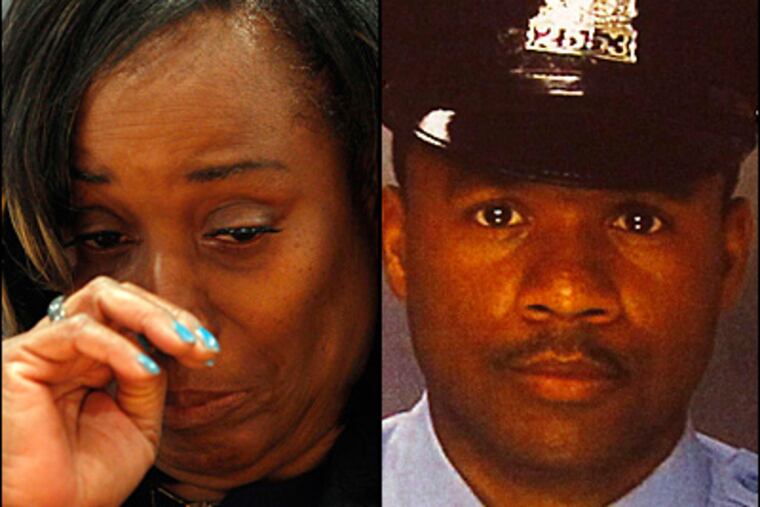Pa. parole board seeks to have suit by slain officer’s family dismissed
Without comment, a federal court yesterday dismissed a civil suit filed by the family of Philadelphia Police Officer Moses Walker Jr., who was slain in the summer by a criminal out on "special probation."

This story corrects a previous version.
The Pennsylvania Board of Probation and Parole and its chairman have asked a federal court to dismiss a civil suit filed by the family of Philadelphia Police Officer Moses Walker Jr., who was slain in the summer by a criminal out on "special probation."
Walker's family filed the suit in November, seeking damages against the board and chairman Michael Potteiger. Walker, 40, was slain during an attempted stickup Aug. 18 as he walked to a bus stop after an overnight shift in North Philadelphia.
The law firm representing Walker's family, however, said it will "vigorously oppose" the motion by the Attorney General's Office to dismiss the case and wants a jury trial. The firm - Satlz, Mongeluzzi, Barrett and Bendesky – said it is preparing a response to the board's motion.
The family said in its suit that Walker's death was the result of a "systemic breakdown" that occurred when his alleged killer, Rafael Jones, 23, was allowed on the street when he should have been behind bars.
Jones had been released from prison 10 days earlier after serving four years in prison on a gun charge. He was supposed to be under electronic monitoring as a condition of his release, but the monitoring was never set up. Jones also remained free after he failed a drug screening, despite a judge's order that he be arrested after even one positive test result.
The suit also alleges that Jones was allowed to remain on the street due to an "unwritten policy" employed by the board to limit probation and parole arrests as a way of making it appear recidivism rates for parole and probation offenders are lower than they actually are.
The suit alleges wrongful death and civil rights violations, and seeks damages and a jury trial. If the board had arrested Jones after the failed test, the family said, Jones would have been taken into custody days before Walker was killed.
However, when the Attorney General's Office, representing the parole board, filed the motion to dismiss the complaint last week. It argued among, other things items, that Walker's murder was not "forseeable," that the government can't be financially responsible for every tragedy, and that the suit failed to show Potteiger was personally involved in any of the events.
After Walker's death, the policies of the state board came under fire by politicians, members of the Police Department, and community leaders.
Recently, the parole board fired three employees who oversaw the Jones case. It also announced changes that include making sure judges are made aware when certain offenders have been denied parole and are approaching their maximum sentences and the use of GPS monitoring to replace the current electronic system.